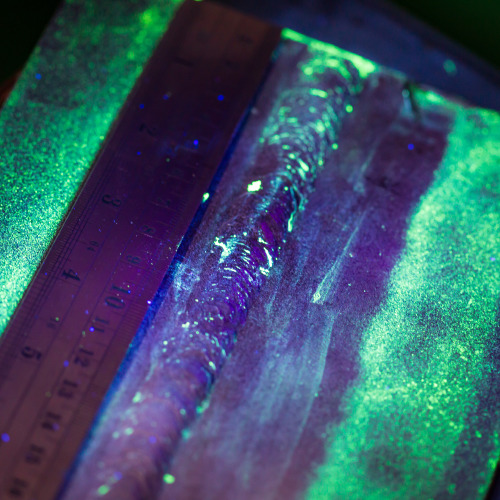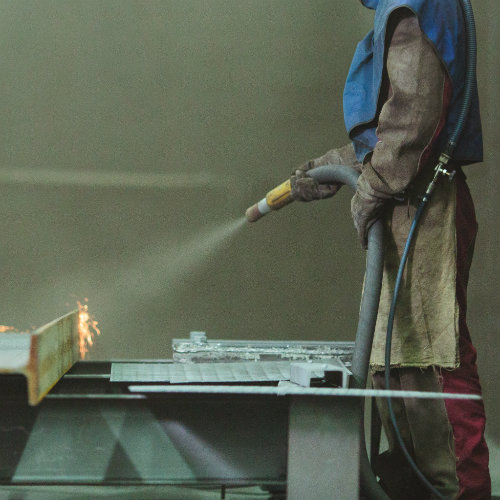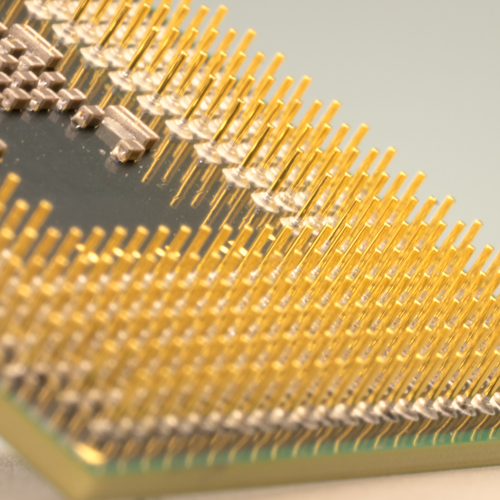Copper Sulfate Testing
Copper sulfate testing is a crucial method for verifying the corrosion resistance of aerospace components. It ensures the safety, reliability, and longevity of parts that are critical to the success of aerospace missions, guaranteeing adherence to regulatory standards.
At Valence, we understand the importance of material integrity, which is why copper sulfate testing is a cornerstone of our non-destructive testing services. By ensuring that components meet stringent quality criteria, we contribute to the aerospace industry’s overarching goal of achieving unparalleled safety and performance in all operations.
Basic Principles Of Copper Sulfate Testing
Copper sulfate testing is a non-destructive testing method used extensively in the aerospace and defense industries to assess the surface integrity of metallic components. This test is designed to identify the presence of uncoated areas, cracks, or other surface imperfections that could compromise a component’s corrosion resistance. The process involves applying a copper sulfate solution to the surface of the material being tested. If there are any imperfections, the copper will deposit in those areas, indicating potential weaknesses in the material’s protective coating or structure.
Application In Non-Destructive Testing
This form of testing is crucial for materials that are expected to maintain high levels of performance in corrosive environments, such as those found in aerospace applications. Copper sulfate testing is particularly valuable because it can be conducted without causing any damage to the component being examined, allowing for accurate assessment of parts that are in service or about to be deployed.
Corrosion Resistance Is Critical In Aerospace Component Safety
Corrosion can lead to material degradation, compromising the structural integrity and reliability of parts that are essential for safe flight operations. For aerospace components, which are often exposed to extreme environmental conditions, including high humidity, saltwater, and varying temperatures, the ability to resist corrosion is paramount. Copper sulfate testing plays a pivotal role in verifying that components possess the necessary corrosion resistance before they are installed in aircraft.

Corrosion’s Impact On Component Lifespan And Performance
The impact of corrosion on aerospace components can affect everything – from fuel efficiency to the overall lifespan of an aircraft. Components weakened by corrosion are more likely to fail, leading to increased maintenance costs, downtime, and, in worst-case scenarios, catastrophic failures that could jeopardize safety. By utilizing copper sulfate testing, aerospace engineers and quality assurance teams can identify weaknesses early in the component’s lifecycle, ensuring that every part meets stringent safety standards. This proactive approach to maintenance and safety significantly extends their service life, contributing to more sustainable and cost-effective operations.
Valence’s Approach To Copper Sulfate Testing
To ensure that every component undergoes a comprehensive evaluation, Valence meticulously conducts copper sulfate testing, ensuring that every component undergoes a comprehensive evaluation to detect any surface imperfections or inconsistencies that could compromise its corrosion resistance. The process begins with a thorough cleaning of the component to remove any contaminants that might affect the test results. Following this, a carefully prepared copper sulfate solution is applied under controlled conditions. Our technicians are highly trained to interpret the results accurately, ensuring that any potential issues are identified and addressed promptly.
Adherence To Aerospace Industry Standards
Our commitment to quality and safety is reflected in our strict adherence to aerospace industry standards and regulations for copper sulfate testing.
We understand that the components we test are critical to the safety and performance of aerospace vehicles, and our testing protocols are aligned with the highest industry standards. By ensuring that our testing processes comply with these standards, we provide our clients with the assurance that their components are capable of withstanding the rigors of aerospace environments.
The Benefits Of Choosing Valence For Copper Sulfate Testing
Technical Expertise And Advanced Capabilities
Choosing Valence for copper sulfate testing offers unparalleled advantages, stemming from our deep technical expertise and advanced testing capabilities. Our team comprises industry-leading experts with extensive experience in non-destructive testing and quality assurance for aerospace components. We utilize state-of-the-art equipment to conduct copper sulfate testing, ensuring accurate and reliable results. This level of expertise ensures that our clients receive comprehensive assessments that contribute to the safety and longevity of their aerospace components.
Commitment To Quality And Customer Satisfaction
At Valence, our commitment to quality extends beyond our testing processes to encompass every interaction with our clients. We understand the critical nature of the components we test and the trust our clients place in us to ensure their integrity. Our approach to copper sulfate testing is characterized by meticulous attention to detail, adherence to industry standards, and a proactive stance on identifying and addressing potential issues. We pride ourselves on our ability to deliver timely, accurate testing results, enabling our clients to make informed decisions about their components.

Final Thoughts
Copper sulfate testing plays a vital role in verifying the corrosion resistance and ensuring the safety of aerospace components. We leverage this testing method as part of our comprehensive approach to quality assurance, adhering to strict industry standards and utilizing our technical expertise to maintain the integrity of every component we handle. Our commitment to quality, safety, and customer satisfaction shows our dedication to supporting you in achieving your operational and safety objectives.
Frequently Asked Questions
What are the standards governing Copper Sulfate Testing?
The test follows MIL-STD-753 for stainless steel alloys with a minimum of 16% chromium.
Can Copper Sulfate Testing be used on all types of stainless steel?
It is recommended for austenitic, precipitation-hardened, and ferritic 400 series stainless steels with at least 16% chromium, but not for martensitic 400 series with less than 16% chromium.
What does a positive Copper Sulfate Test indicate?
A positive result, shown by copper deposits, indicates the presence of free metallic iron on the surface.
Are there dilution variations for the Copper Sulfate Solution?
Yes, the standard dilution is 1.6% by weight, but 3% and 5% dilutions can be used for comparative testing.
Is Copper Sulfate Testing applicable for food processing surfaces?
This test cannot be applied to surfaces of items to be used in food processing due to potential contamination.
How long is the Copper Sulfate Solution viable?
The solution should not be used if prepared more than 2 weeks before the test.
What are the limitations of Copper Sulfate Testing?
It is not suitable for detecting ferritic contaminant in 400 series stainless steels due to the likelihood of false positives.
How does Copper Sulfate Testing compare to other passivation tests?
It is quicker and more economical, making it a common choice for rapid assessment, though it has limitations with certain stainless steel types.
Can Copper Sulfate Testing be used for non-passivation purposes?
While primarily for evaluating passivation, it can also assess the need for passivation by detecting free iron on stainless steel surfaces.
Are there industry standards for the interpretation of Copper Sulfate Test results?
Results should be compared against a baseline established through testing on raw stock, passivated steel, and steel with known free iron presence to quantitatively assess the surface condition.
Nondestructive Testing Services
Conductivity Inspection
Conductivity inspection measures the electrical conductivity of a metal part or component. This is an in process test of chemical processing to verify the integrity and consistency of a chemical processing operation.
Hardness Testing
Hardness testing verifies the hardness of the base material, and can be used to validate that previous processes have been performed correctly. All Valence products are guaranteed to meet specified standards.
FPI (Fluorescent or Liquid Penetrant Inspection)
Fluorescent penetrant inspection is a type of dye penetrant inspection where a non-permanent fluorescent dye is applied to a non-porous part to detect cracks and defects that are invisible on sight inspection. This type of inspection is a highly efficient method to testing parts.
Magnetic Particle Inspection
Magnetic particle inspection detects surface and shallow subsurface discontinuities in ferromagnetic materials. This inspection can give immediate data and reveal errors or defects. It will prevent future leaks and other flaws.
Eddy Current Testing
Eddy current inspection uses electromagnetic induction to find and characterize surface and sub-surface defects in conductive materials. It is a highly sensitive form of testing for small surface defects, providing immediate results.
Copper Sulfate Testing
Copper sulfate testing verifies the effectiveness of, or need for passivation on a stainless steel part. This test is proficient in advanced aerospace applications.
Boroscope Inspection
Boroscope inspection allows the internal surfaces of geometrically complex components to be visually inspected for surface finish integrity. The inspection can prevent small issues in materials that potentially lead to huge losses in the long-term.
Valence performs all of these services to the highest degree of care, with approvals for most prime and military specifications. Our products and services significantly enhance safety, long-term use, and consistency in the aerospace industry. View our specs here.
NDT Capability Sizes
| Valence Eastman | L | Valence Wichita | L | Valence Grove | L | Valence Garden Grove | L | Valence Los Angeles | L | Valence Seattle | L | Valence Everett | L |
|---|---|---|---|---|---|---|---|---|---|---|---|---|---|
| Eddy Current | No Limit | Hardness/Conductivity | No limit | Hardness/Conductivity | No limit | Abrasive Blast | 5' | Hardness/Conductivity | No limit | Hardness/Conductivity | No limit | Hardness/Conductivity | No limit |
| Hardness/Conductivity | No limit | Magnetic Particle Big | 6' | Penetrant | 24' | Glass Bead | 3' | Penetrant | 27' | Magnetic Particle | 4.5' | Penetrant | 30' |
| Magnetic Particle | 4.5' | Penetrant | 13' | Laser Part Mark | 4' | Penetrant | 6' | ||||||
| Penetrant | 20' | Stress Relieve Bake | 3' | ||||||||||
| Ultra Sonic Cleaning | 4' |
Nondestructive Testing News
Valence Surface Technologies Adds Nondestructive Testing (NDT) Capabilities in Southern California
GARDEN GROVE, CA MARCH 21, 2022 Valence Garden Grove Operations (formerly known as Coastline Metal Finishing) has completed the installation and commissioning of their new Nondestructive testing (NDT) line. The new line, along with inspection personnel, has passed...





